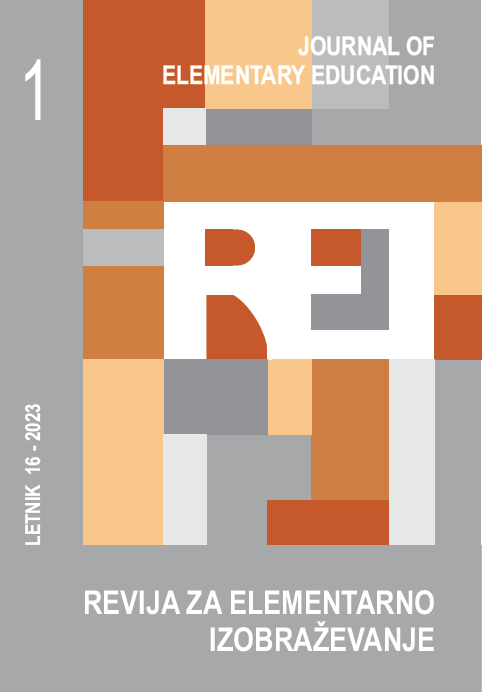Environmental Literacy of ISCED 2 Pupils in Poland
DOI:
https://doi.org/10.18690/rei.16.1.1665Keywords:
Environmental literacy, determinants, ISCED 2, authorial analytic tool, PolandAbstract
Environmental literacy represents the extent of environmental knowledge, attitudes, sensitivity and responsible environmental behaviour. The presented study focuses on the environmental literacy of ISCED 2 pupils in Poland. The survey analysed the relationship between the environmental literacy and its significant determinants. The connection between environmental literacy and gender, school grade and leisure time of the respondents was determined. More than three hundred respondents took part in the testing.
A moderate positive relationship between the dimensions of environmental literacy was demonstrated. Analyses have also shown that environmental literacy is significantly determined by gender, school grade and leisure activities, especially outdoor activities.
Downloads
References
Bogner, F. X., Johnson, B., Buxner, S. & Felix, L. (2015). The 2-MEV model: Constancy of adolescent environmental values within an 8year time frame. International Journal of Science Education, 37(12), 1938-1952. https://doi.org/10.1080/09500693.2015.1058988
Buchcic, E. (2002). Teaching environmental education in the light of teachers’ experience. Environmental Education – its principles and reality after the school reform. Zeszyty Naukowe Komitetu „Człowiek i srodowisko”, 31, 271-278.
Burger, T. (2005). Swiadomosc ekologiczna społeczenstwa polskiego. Warszawa: Instytut Gospodarki Przestrzennej i Mieszkalnictwa.
Čagran B., Sadek L., & Ivanuš Grmek M. (2011). Eksperimentalno preverjanje učinkov projektnega pouka pri predmetu spoznavanje okolja. Journal of Elementary Education, 4(1/2), 5-22. https://journals.um.si/index.php/education/article/view/310
Činčera, J. (2013). Paradigmatická proměna domácího pojetí environmentální výchovy. Pedagogika, 62(2), 182–197.
Činčera, J., Johnson. B., Kroufek, R. & Šimonová, P (2020). Values Education in Outdoor Environmental Education Programs from the Perspective of Practitioners, Sustainability, 12(11). https://doi.org/10.3390/su12114700
Domka, L. (2001). Dialog z przyroda w edukacji dla ekorozwoju. Warszawa – Poznaň: Wydawnictwo Naukowe PWN.
Geng, L., Xu, J., Ye, L., Zhou, W. & Zhou, K. (2015). Connections with Nature and Environmental Behaviors. PloS One, 10(5). https://doi.org/doi.org/10.1371/journal.pone.012724
Grúňová, M., Sané, M., Čincera, J., Kroufek, R. & Hejcmanová P. (2018). Reliability of the new environmental paradigm for analysing the environmental attitudes of Senegalese pupils in the context of conservation education projects. Environmental Education Research, 25(2), 211-221. https://doi.org/10.1080/13504622.2018.1428942
Gul, S. & Yesilyurt, S. (2011). A Study on Primary and Secondary School Students’ Misconceptions abou Greenhouse Effect (Erzurum Sampling). International Electronic Journal of Environmental Education, 1(3), 193-202.
Heimlich, J. E. & Ardoin, N. M. (2008). Understanding behavior to understand behavior change: a literature review. Environmental Education Research, 14(3), 215-237. https://doi.org/10.1080/13504620802148881
Ilhami, A., Riandi, R. & Sriyati, S. (2019). Implementation of science learning with local wisdom approach toward environmental literacy. Journal of Physics: Conference Series, 1157(2). https://doi.org/10.1088/1742-6596/1157/2/022030
Johnson, B. & Manoli, C. C. (2011). The 2-MEV scale in the US: A measure of children’s environmental attitudes based on the theory of ecological attitude. Journal of Environmental Education, 42(2), 84-97. https://doi.org/10.1080/00958964.2010.503716
Kobierska, H., Tarabuła-Fiertak M. & Grodzińska-Jurczak M. (2007). Attitudes to environmental education in Poland. Journal of Biological Education, 42(1), 12-18. https://doi.org/10.1080/00219266.2007.9656101
Kroufek, R., Janovec, J. & Chytrý, V. (2015). Pre-service primary teachers and their attitudes towards nature. In: Fleischmann, O., Seebauer, R., Zoglowek, H., & Aleksandrovich, M. [eds.] The Teaching profession: New Challneges - New Identities. Lit Verlag GmbH & Co. KG, Wien.
McBeth, W. & Volk, T. L. (2010). The National Environmental Literacy Project: A baseline study of middle grade students in the United States. The Journal of Environmental Education, 41(1), 55-67. https://doi.org/10.1080/00958960903210031
NAAEE (2019). K-12 Environmental Education: Guidelines for Excellence Executive Summary. Washington: NAAEE. 16 s.
Nastoulas, I., Marini, K. & Skanavis, C. (2017). Middle School Students Environmental Literacy Assessment in Thessaloniki, Greece. Health and Environment Conference Proceedings. Hamdan Bin Mohammed Smart University, Dubai, 198-209.
Osbaldiston, R. & Schott, J. P. (2012). Environmental Sustainability and Behavioral Science: Meta-Analysis of Proenvironmental Behavior Experiments. Environment & Behavior, 44(2), 257-299. https://doi.org/10.1177/0013916511402673
Parry, J. & Allison, P. (Eds.). (2019). Experiential Learning and Outdoor Education: Traditions of practice and philosophical perspectives (1st ed.). Routledge. https://doi.org/10.4324/9780429298806
Pereira, M. & Forster, P. (2015). The Relationship between Connectedness to Na-ture, Environmental Values and Pro-environmental Behaviours. Reinvention: and
Potočnik K., Golob N. & Sikošek D. (2010). Ali program Ekošola prispeva k odgovornejšemu ravnanju učencev tretjega triletja?. Journal of Elementary Education, 3(2/3), 47-62. https://journals.um.si/index.php/education/article/view/274
Potyrała, K., Walosik, A. & Kuczek, I. (2004). Kształtowanie postaw uczniów liceum ogólnokształcacego podczas realizacji projektu “Ostoja Przyrody”. Edukacja Biologiczna i Srodowiskowa, 2-3(10-11), 163-168.
Ramsey, C. E. & Rickson, R. E. (1976). Environmental Knowledge and Attitudes. The Journal of Environmental Education, 8(1), 10-18. https://doi.org/10.1080/00958964.1976.9941552
Roth, C. E. (1992). Environmental literacy: Its roots, evolution, and directions in the 1990s. Columbus: ERIC Clearingouse for Science, Mathematics and Environmental Education.
Schumm, M. F. & Bogner, F. X. (2016). How Environmental Attitudes Interact with Cognitive Learning in a Science Lesson Module. Education Research International,
Stoczkowska, R. (2002). Reform of education and changes in environmental teaching at the primary-school level. Environmental education – curriculum, methods, effects. Zeszyty Naukowe Komitetu „Człowiek i srodowisko”, 28, 169-175.
Svobodová, S. (2020). Environmental literacy of pupils and its investigation in the Czech Republic. Sociální pedagogika/Social Education, 8(1), 88–104. https://doi.org/10.7441/soced.2020.08.01.04
Svobodová, S. & Kroufek, R. (2018). Možnosti využití škály MSELS pro testování environmentální gramotnosti na základních školách v České republice. Scientia in Educatione, 9(2). https://doi.org/10.14712/18047106.1210
Svobodová, S. & Chvál, M. 2019. The Pilot Verification of the Authoring Research Tool for the Comprehensive Measurement of Environmental Literacy of ISCED Level 2 Pupils in the Czech Republic. In INTED2019 Proceedings: 1947-1958, Valencia, Spain.
Tavakol, M. & Dennick, R. (2011). Making sense of Cronbach’s alpha. International
Whitburn, J., Linklater, W. & Abrahamse, W. (2020). Meta‐analysis of human connection to nature and proenvironmental behavior. Conservation Biology, 34(1), 180-193. https://doi.org/10.1111/cobi.13381
Downloads
Published
Issue
Section
License
Copyright (c) 2023 Silvie Svobodová

This work is licensed under a Creative Commons Attribution 4.0 International License.
